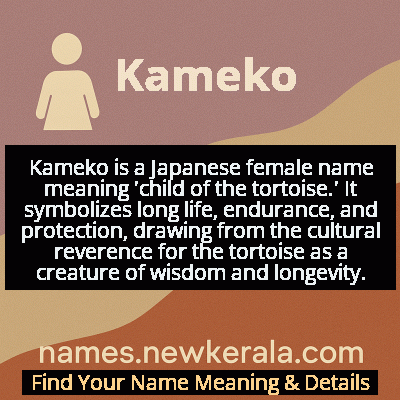Kameko Name Meaning & Details
Origin, Popularity, Numerology Analysis & Name Meaning of Kameko
Discover the origin, meaning, and cultural significance of the name KAMEKO. Delve into its historical roots and explore the lasting impact it has had on communities and traditions.
Name
Kameko
Gender
Female
Origin
Japanese
Lucky Number
2
Meaning of the Name - Kameko
Kameko is a Japanese female name meaning 'child of the tortoise.' It symbolizes long life, endurance, and protection, drawing from the cultural reverence for the tortoise as a creature of wisdom and longevity.
Kameko - Complete Numerology Analysis
Your Numerology Number
Based on Pythagorean Numerology System
Ruling Planet
Moon
Positive Nature
Diplomatic, friendly, artistic, empathetic.
Negative Traits
Over-sensitive, moody, indecisive, prone to self-pity.
Lucky Colours
Green, cream, white.
Lucky Days
Monday.
Lucky Stones
Pearl, moonstone.
Harmony Numbers
1, 3, 4.
Best Suited Professions
Diplomats, mediators, caregivers, artists.
What People Like About You
Cooperative spirit, friendliness, artistic talent.
Famous People Named Kameko
Kameko Shibata
Educator and women's rights advocate
Founded one of the first schools for girls in rural Japan and promoted women's education
Kameko Nakamura
Traditional textile artist
Preserved and taught ancient kimono dyeing techniques, designated as Living National Treasure
Kameko Tanaka
Author and poet
Won the prestigious Akutagawa Prize for literature in 1998
Kameko Suzuki
Environmental scientist
Pioneered research in marine conservation and turtle habitat preservation
Name Variations & International Equivalents
Click on blue names to explore their detailed meanings. Gray names with will be available soon.
Cultural & Historical Significance
During the Edo period, names containing 'kame' were particularly popular among merchant and artisan families who valued the tortoise's symbolic protection for business longevity and family continuity. The '-ko' suffix, meaning 'child,' creates a gentle, feminine quality while maintaining the powerful symbolism of the tortoise, making it a name that balances strength with grace. This combination represents the ideal of feminine strength in Japanese culture—resilient yet gentle, enduring yet adaptable.
Extended Personality Analysis
Women named Kameko are typically perceived as patient, resilient, and deeply grounded individuals. They embody the tortoise's symbolic qualities—moving steadily through life with purpose and determination, rarely rushing but always progressing. Their calm demeanor often makes them natural peacemakers and trusted confidantes. Kameko personalities tend to be observant and thoughtful, preferring to consider situations thoroughly before acting.
They possess an inner strength that allows them to endure challenges with remarkable composure, much like the tortoise that carries its home wherever it goes. This combination of patience and endurance often leads to success in long-term endeavors and relationships. While they may appear reserved initially, those who know them well appreciate their loyalty, wisdom, and the quiet humor that emerges in comfortable settings. Their approach to life is methodical and purposeful, valuing quality over speed in all pursuits, and they often serve as stabilizing influences in their families and communities.
Modern Usage & Popularity
In contemporary Japan, Kameko is considered a traditional name that has seen fluctuating popularity. While it was more common in the early to mid-20th century, it has become relatively rare in recent decades as parents trend toward more modern-sounding names. However, it maintains a niche appeal among families who value traditional symbolism and cultural heritage. The name is occasionally used in international Japanese communities as a way to preserve cultural identity. In the 21st century, there's been a slight resurgence of interest in nature-based traditional names, which has brought renewed attention to Kameko among parents seeking meaningful, historically grounded names with positive symbolism. Its usage remains most common in rural areas and among families with strong connections to traditional crafts or businesses where the longevity symbolism holds particular relevance.
Symbolic & Spiritual Meanings
The name Kameko symbolizes longevity, endurance, protection, and wisdom. Like the tortoise that lives for centuries, it represents the ability to withstand the tests of time and emerge stronger. The tortoise's shell symbolizes protection and self-sufficiency, while its slow, deliberate movement represents thoughtful progress and stability. In broader symbolic terms, Kameko embodies the concept of 'slow and steady wins the race,' emphasizing that consistent effort and patience lead to lasting success. The name also carries associations with water elements (as tortoises are amphibious), representing emotional depth and adaptability. In spiritual contexts, it connects to earth energy, grounding, and the wisdom that comes from experience and observation rather than haste, making it a name that signifies both practical resilience and spiritual depth.

